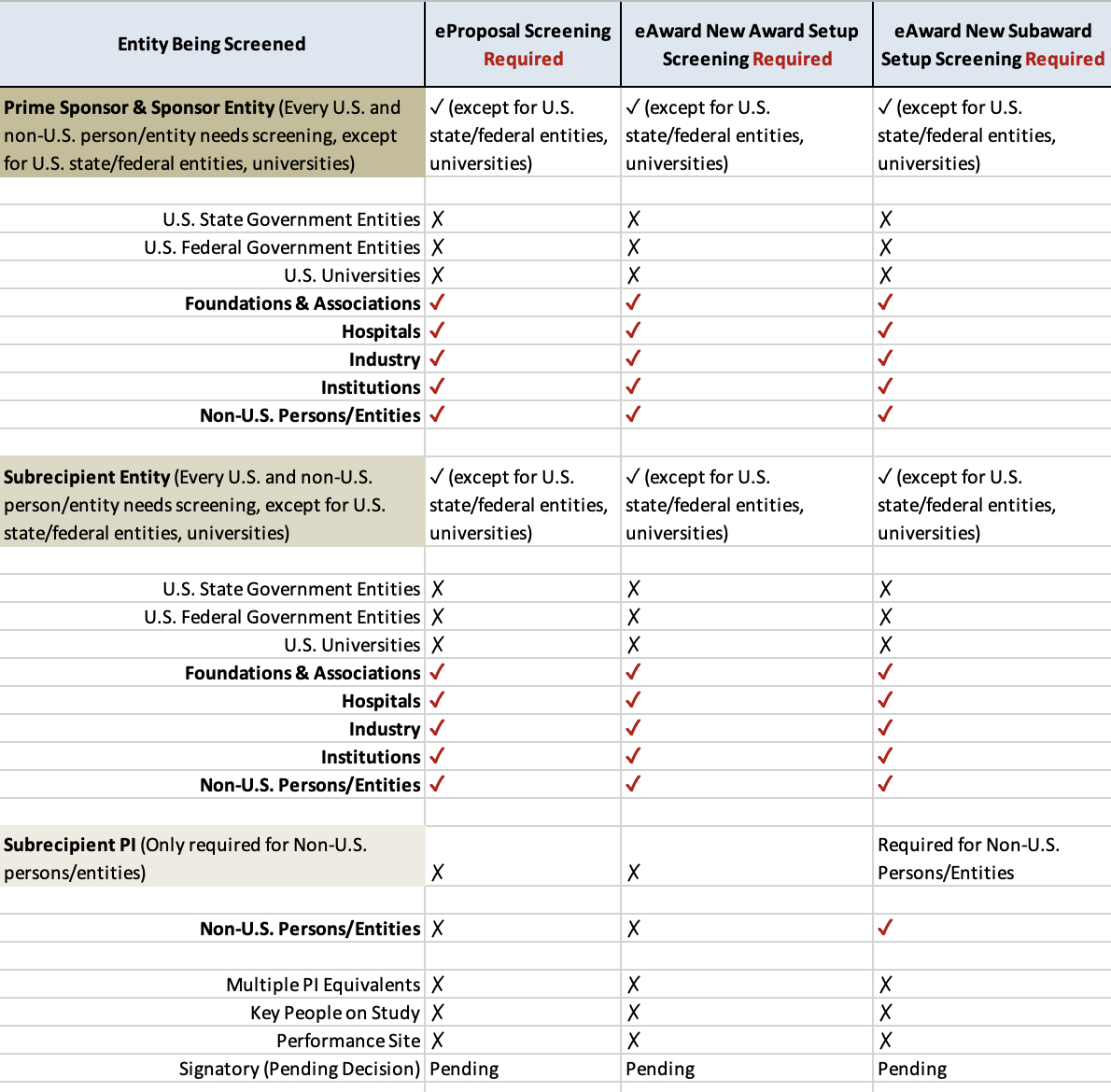Procedure Library
Sponsored Projects
Policies & Compliance
- Research Conduct
- Combatting Human Trafficking
- Federal Disclosure Requirements
- Research Handbook
- 1. Roles & Responsibilities
- 2. Standards for Conduct of Research
- 3. Overview of Sponsored Projects Administration
- 4. Funding Sources & Opportunities
- 5. Proposal Development
- 6. Budget Development
- 7. Procedures for the Submission of Proposals
- 8. Award Acceptance
- 9. Award Management
- 10. Research Related Regulations, Policies & Procedures
- 11. Other Conduct of Research Issues
- 12. Acronyms & Definitions
- 13. Glossary
- Procedure Library
- Regulations Library
Restricted Party Screening
Purpose
The U.S. Department of the Treasury's Office of Foreign Assets Control (“OFAC”) administers and enforces U.S. economic sanctions. These laws restrict - or, in some cases, entirely prohibit - U.S. persons from engaging in transactions or “doing business with” certain designated individuals, entities, or countries.
A “U.S. person” (22 C.F.R. § 120.15; 15 C.F.R. § 772.1) includes:
- U.S. citizens (born or naturalized)
- Lawful permanent residents ( “green card” holders)
- "Protected individuals" under 8 U.S.C. § 1324b(a)(3), including refugees and asylees
- Corporations or other entities incorporated in the United States
One of OFAC's key tools is the Specially Designated Nationals and Blocked Persons List (“SDN List”) - a continuously updated list identifying persons and entities associated with terrorism, narcotics trafficking, weapons proliferation, human rights violations, and sanctioned governments.
Other U.S. agencies, such as the Department of Commerce, maintain additional lists that restrict certain exports or financial transactions or require prior authorization.
Applicability
As a U.S. entity, the University is legally obligated to comply with all U.S. sanctions
and export control regulations. This includes ensuring that the University does not
conduct business with individuals or organizations on the SDN List or other restricted-party
lists.
Non-compliance can result in significant civil and criminal penalties for both the University and individual employees.
About Screening
Restricted Party screening is the process of checking the name of individuals or entities involved in a proposed University activity - research collaborations, procurement transactions, subawards, vendor relationships, donations, or any other form of engagement - against the required U.S. government restricted-party lists.
Screening before entering into any relationship helps prevent inadvertent violations.
Instructions
- PI's and admins must contact OSP for restricted-party screening whenever a sponsored
project proposes or involves:
- Individuals collaborating with non-US nationals in the U.S.
- Individuals collaborating with non-US nationals outside of the U.S.
- Subcontractors, vendors, donors, or partners who are non-U.S. nationals
The grid below details when screening is required:
NOTE: For collaborations not associated with a sponsored project, contact the Research Security Office directly to request screening.
Identifying When Export Controls or Sanctions May Apply
Export control or sanctions requirements may apply depending on:
- The subject matter or scope of work
- The nationality, location, or affiliations of the collaborators
- What the collaborators will do with the information, materials, or technology you share
We strongly recommend reviewing the Export Control Basics briefing to better understand these requirements.
Activities that may require screening include:
- Professional or business exchanges with foreign countries or foreign nationals subject to U.S. government restrictions
- Sending or receiving tangible items or technical data internationally
- Sharing technical knowledge with foreign persons inside the United States (including employees and students
- International travel involving research equipment, data, or collaborations
- Work involving technologies with potential defense, earospace, or intelligence applications
FAQ
Please discuss your project with Research Security, Export Control & Foreign Influence
Please discuss your project with Research Security, Export Control & Foreign Influence
Please discuss your project with Research Security, Export Control & Foreign Influence
Related Policies and Procedures
Be notified of page updates
Procedure Library Feedback
Do you have comments or suggestions for this procedure?
